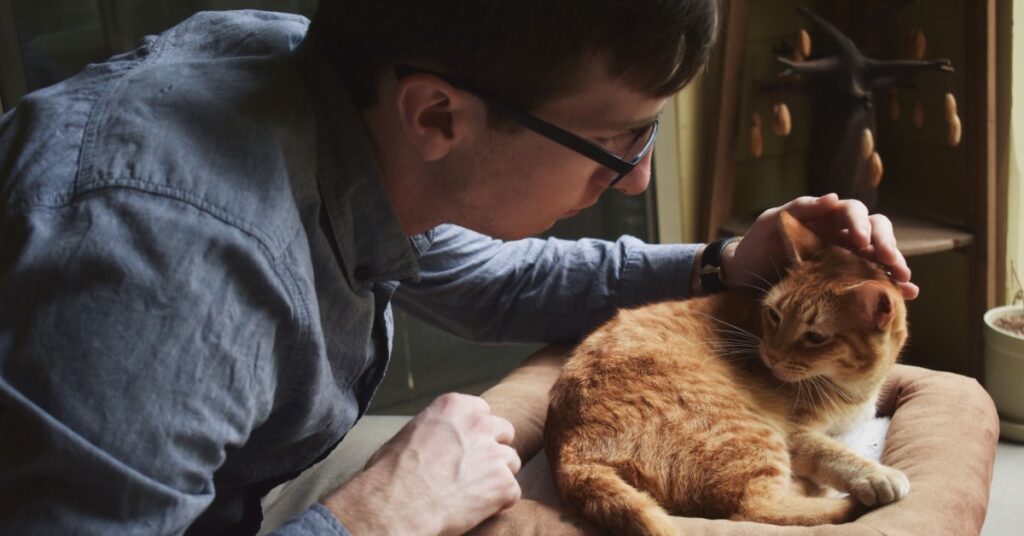
Where Do Epidemiologists Work?
Epidemiologists work in many settings, including hospitals, universities, and federal, [...]

Climate change, zoonotic diseases, bioterrorism: our society is all too familiar with these terms. Each occupies a place at the intersection of public health and veterinary medicine, a nexus where you’ll also find a group of specialized experts equipped to take on these problems: veterinary public health professionals.
According to Merck, today’s veterinarians already provide crucial public health services. They control pet parasites, identify infectious diseases, facilitate guide dog programs for the disabled, and, most importantly, provide epidemiological insights that helps us respond to emerging zoonotic diseases. But earning a Master of Public Health, combined with your Doctor of Veterinary Medicine degree, opens additional doors along this quickly expanding career path.
Long before COVID-19 and its debated origins, we faced the West Nile virus, rabies, Lyme disease, and countless other illnesses breaching the gap between humans and animals. As many animals lose their natural habitats, the UN predicts that zoonotic illnesses will continue to rise.
In addition to diseases, some government agencies worry about bioterrorism, food production issues, and the dangers of pollution to animals and humans. Who are they looking to for leadership? Veterinarians with highly focused training in public health may have the answers.
In this guide, we’ll discuss what is an MPH in veterinary public health and whether it’s the ideal specialization for this point in your career. We’ll tackle the following popular topics:
Veterinary public health sits at the center of a Venn diagram. Animals, their environment, and human health all intersect in positive and damaging ways—a concept known as “One Health.” If one circle of the diagram suffers or flourishes, experts see a difference in our overall global health.
According to the Centers for Disease Control (CDC), the links between veterinarian practice and our public health programs include:
Professionals in this area typically come from a veterinary background. They’ve likely attended a college of veterinary medicine, studying public health either after or during their veterinary training.
A quickly changing environment places these specialists at the forefront of some of today’s biggest challenges, including food production management, unexplained illnesses, bioterrorism, and pollution. For these reasons, DVM/MPH programs are catching the eye of working professionals and young students alike.
Veterinary public health officials stand at the meeting place between human health and animal life. They understand that vigilance, awareness, and good science can protect society from zoonosis.
But their role goes far beyond disease control. The combination of veterinary training with the education of a public health professional results in a well-rounded expert in communication, policy, and strategy required to prevent another pandemic.
With the rise of public health awareness—and its massive effects during the COVID-19 pandemic—organizations and private companies are now calling for greater funding for public health sectors. Public health programs saw a 20 percent uptick in applications in 2020, specifically for master’s programs.
An MPH is a relatively broad degree that often includes a specialization. Career paths and coursework range from topics in the healthcare sector and social justice to research and even government work. Some students come from a background in medicine, biology, health sciences, veterinarian services, or the general public health sector.
One of the best things about the degree is its wide reach across so many students and passions. Depending on the school, an MPH program may offer specialties and electives in:
The vast majority of master’s of public health with a specialization in veterinary health degrees are delivered through dual-degree programs. Students can complete their Doctor in Veterinary Medicine in tandem with the MPH degree, often listed as a VMD or DVM/MPH program.
This isn’t always the case, however. Students who already completed veterinary school may also seek out an MPH with a veterinarian specialization.
For example, The University of Tennessee – Knoxville (UTK) offers related coursework and a practical internship toward the end of its MPH in Veterinary Public Health program. Professors approve internships with a related organization or research setting under the supervision of a mentor.
To expand accessibility, the university offers its public health degree in an online format as well as on campus.
The university’s coursework covers:
Similar top programs, such as University of Pennsylvania’s VMD/MPH program, offer finely tuned tracks within the specialization itself. In addition to a generalized track, students can choose from environmental health, global health, and the “One Health” concept. At the culmination of this program, candidates complete a capstone project in their specialization. This is in addition to related fieldwork.
The significant influx of MPH students may also be attributed to the upcoming opening of veterinary government positions. The University of Tennessee- Knoxville program page points out that nearly 50 percent of the Commissioned Corps of the US Public Health Service will retire in the next few years.
Public health veterinarians find a wide range of specialized positions after private, public, military, and government organizations. The top employers include:
As for specific careers, you’ll find job titles that focus on research, education, government affairs, environmental science, and of course, medical services and epidemiology. Some of the most common MPH specialties include:
Salaries for those with a background in veterinary epidemiology range based on your organization or company. Glassdoor reports a salary of an average of $92,800 a year for public health veterinarian professionals.
Take a look at the topics above and note how many depend on a safe and healthy planet. When you add veterinary expertise to the mix, these topics broaden to include a more extensive scope of study and career opportunities.
Veterinary public health jobs address what is known as the “One Health,” concept, which stresses the interconnectedness of life on our planet. You’ll spot this term used in many of today’s top degree programs and their curriculum and by the CDC.
“One Health” specialists are hired by government agencies and private sector companies to manage:
The MPH is ideal for two groups. According to the Iowa College of Public Health, the first group consists of practicing veterinarians looking to shift into a public health career or become board certified in Veterinary Preventive Medicine.
The second group is made up of students who earn an MPH and DVM simultaneously. These students either choose to become veterinarians or pursue the public health career track. In either case, students then branch off to either the public or private sectors.
Trained professionals find job postings on the local, national, and global level with major organizations that include:
The University of Tennessee – Knoxville points out that the USDA—the largest public employer in the US of veterinarians—will see a massive influx of open positions in the next few years.
In the private sector, look to pharmaceutical companiess. Independent food companies utilize MPH grads to maintain safety standards for production.
Graduates may also find more specialized roles within larger animal health companies conducting research and public education initiatives.
Professionals who specialize in veterinary medicine and public health earn enviable salaries, depending on where they work. Glassdoor lists the average salary of a public health veterinarian as about $92,800. Specific jobs at the US Department of Agriculture include mid- and supervisor-level positions around this pay zone.
Salaries vary based on your role, the type of company or organization, and where you live. Work in an area with a higher cost of living, such as Los Angeles, and you might make $100,000 a year.
If we break this down into more specific roles, you’ll find that veterinarian epidemiologists make an average of about $63,000 a year, with higher-paying cities reaching the high $70,000s. These numbers line up with the standard MPH salaries in non-veterinary fields.
ZipRecruiter specifies that the average salary of those with a master’s in public health hovers around $74,000 nationwide. The higher-paid positions that we listed above typically require advanced degrees to provide that competitive edge.
Biostatistician careers, for example, typically require advanced training or a master’s degree, particularly if you’re eyeing a highly specialized role in veterinarian health. These jobs pay an average of approximately $124,000 per year, according to Glassdoor.
The most crucial link between a master’s and salary is choice—particularly in the medical field. Training both in the public and veterinary health world opens up career paths across the board.
Prospective students choose an MPH program after gaining experience in the field or selecting a DVM degree concentration. University of Tennessee – Knoxville students can enter the program after gaining their license as a licensed veterinary medical technician, through the school’s dual DVM/MPH pathway, or from a complete graduate veterinary program.
Standard admission requirements include:
Many programs also require relevant work experience or coursework in related fields such as science and mathematics. In some cases, you may be required to hold a bachelor’s in public health or have completed public health courses.
Tuition can be costly. You will need about four or five years to complete the full program. For example, the sample breakdown of costs for the DVM/MPH program at Tufts University runs $60,694 a year. Many programs offer significant financial aid to post-graduate students in the form of scholarships and assistantships. The University of Tennessee – Knoxville costs significantly less for both in-state and out-of-state students.
Though we’ve touched on this a bit, let’s explain the dual degree format a bit further. Dual programs traditionally combine a Doctor of Veterinary Medicine (DVM) and a Master of Public Health. Curriculum design intentionally cross-references coursework from one program to the other. For example, later in the curriculum, the school may introduce common public health topics like zoonoses and preventive medicine, but through the lens of their earlier veterinary studies. Classes either run in tandem or transition to vet-related issues as they progress.
These programs understandably take a bit longer than studying either topic on their own. Students may begin with two years of vet training before transitioning into related public health studies.
Much like independent MPH programs, choosing a dual-track requires students to earn practical experience in the field. Internships and externships allow trainees to apply what they’ve learned and transition into a career after graduation.
A master’s degree can open doors in unique areas of your field. Not only can an MPH in Veterinary Public Health unlock higher salaries in some jobs but it also may help you answer the call of a greater social purpose.
Students and professionals with a background in animal health can expand their reach with this highly specialized and yet highly in-demand skill set.
(Updated on July 22, 2024)
Questions or feedback? Email editor@noodle.com

Epidemiologists work in many settings, including hospitals, universities, and federal, [...]

Loving animals isn't enough to become a vet. You have [...]

You can enroll in a joint degree or dual degree [...]

MSWs have plenty of career options outside of one-on-one therapy [...]
Categorized as: Medicine, Public Health, Nursing & Healthcare